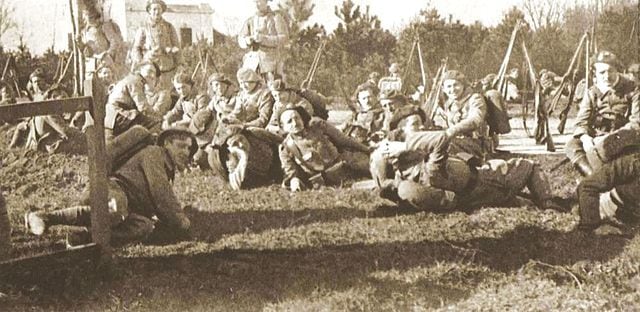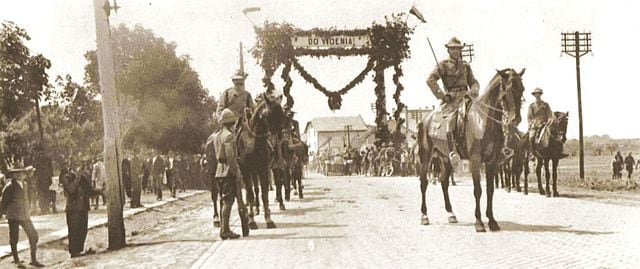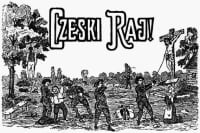Pěkný článek 
Seven Days Czechoslovakia - Polish War
Categories: Years of war and revolution
Phe 23rd of January 1919 came and Czechoslovak troops, together with the legions, started the fight for the Polish occupied Těšín region. In this seven-day war, Czechoslovakia had the upper hand from the beginning and quickly occupied the whole area. The war also brought about a rare dispute between Masaryk and Beneš, with Masaryk wanting to fight and Beneš fearing the reaction of the powers of the agreement. Perhaps the tragedy of 1938 was born at this time. It is clear that if Masaryk had still been president in the autumn of 1938, the Munich Agreement would never have been accepted.
Těšín has always been a nationally diverse region. Czechs, Germans, Poles and Jews lived here. However, the majority of the population was ethnically undefined, or rather they considered themselves Silesians (Šlonzács). Thanks to the job opportunities that arose in the surrounding area, the region came to the region during the late 19th century. During the end of the 19th century, new settlers began to arrive in the region, especially from Halych (today's Poland), and the Polish population in Těšín increased. The indigenous population of "Šlonzáky" had very good relations with both the Czech and German population of Těšín, but they were quite sharply "anti-Polish".These were largely due to the influx of cheaper labour from Halych.

Members of the French legions in Těšín
Historically, Těšín was annexed to the lands of the Bohemian Crown in 1327. After the collapse of the empire, the Polish army quickly occupied a large part of Těšín and cut the key route from Bohumín to Košice for Czechoslovakia. Czechoslovakia initially tried to resolve the dispute diplomatically, but Poland did not honour the agreements. In particular, they started forced conscription into the Polish army for some parts of the population and Poland tried to legalize its stay in the territory by calling elections to the Polish Sejm. This was unequivocally rejected by the Czechoslovak government and it was decided to resolve the whole situation militarily.
War operations
Czechoslovakia had the upper hand in this short war. Poland had military conflicts on virtually all of its borders, especially in the Ukraine. Lieutenant Colonel Josef Šnejdárek was in charge of the whole operation in Teshinsk. He had at his disposal the 21st Rifle Regiment consisting of French Legionnaires (3 battalions) and then one battalion each from Regiments 54 (Olomouc), 93 (Sumperk) and the 17th Hunting Battalion from Frenštát. In addition, it had a battalion of Czech Volunteers from Bohumín, a battalion of volunteers from Orlová and units of the so-called Těšín National Guard, approximately 5,000 men. In addition, the Czechoslovak troops were to be supported by the advance of the 35th Legionary Regiment (Italy) under Colonel Graselli, which was advancing from north-western Slovakia.
The Czechoslovak troops were then further reinforced during the fighting. The 2nd Brigade, with 6 battalions, 2 batteries of artillery and one cavalry squadron, was added to the list of units.
The Polish side under the command of Franciszek Latinka was able to field 5 battalions of infantry, 4 separate machine gun companies, an artillery battery and a mounted platoon. The list of available units also included 550 members of the Polish gendarmerie and 6,500 local Polish volunteers. Like the Czechoslovak troops, the Polish side of the army was reinforced during the fighting.

Members of the Italian Legions leave Slovakia for Těšín
The course of the fighting
 |
|
Anti-Czech propaganda in Těšín |
On 21 January Czechoslovakia called on Poland to withdraw its troops and state administration from Těšín. On 23 January, the Polish and Czech commanders met in Těšín in the presence of officers from the English, French, and Italian armies. An officer of the US army was also present. Czechoslovakia here shielded the authority of the states of the agreement. An ultimatum was given to the Polish side demanding the clearance of the area up to the Bela River. As Poland did not react to this ultimatum, Czechoslovak troops began to advance in the directions of Bohumín and Karvina. Bohumín was captured relatively easily, Karvina only after heavy fighting. Our troops then entered Těšín itself without a fight.
The Czechoslovak troops then advanced to secure the Bohumín-Těšín-Jablunkov railway. The Polish army began to retreat to Skočov. Here the war operations were terminated at the insistence of the agreement powers.
The different views of Masaryk and Beneš
There are very few disputes that the public has become aware of. Rather, an idyllic view of the collaboration of these two men prevails. In January 1919, Benes was at the peace conference in Paris. There he perceived a certain distaste for the Czechoslovak army's wartime operations and insisted on their immediate cessation. In contrast, Masaryk was a supporter of a military solution and urged the commanders to proceed until the last seconds before the armistice was concluded. It is also not without interest that after the end of the fighting, Lieutenant Colonel Šnejderek was received by our President and given a special commendation.
Casualties of the Seven Days War
The war was fortunately short, and so the list of casualties is not so terrible.
Czechoslovakia
53 killed, 124 wounded and 7 missing.
Poland
92 killed, 855 wounded and 813 missing (deserters, mainly from the Kraków Regiment)
Both sides subsequently accused each other of mutual atrocities. The civilian population also embarked on its own "partisan war". The memoirs of Czechoslovak soldiers speak of the insidious actions of the local Polishand the friendly relations between our army and the predominantly Shlonzak population. But the opinion of the Polish side is, of course, the opposite. Both countries have built memorials to their fallen. After the occupation of Těšín by the Polish army in 1938, the Czech one in Orlová was immediately destroyed by the Poles. After the Second World War it was partially restored.
But the Germans intervened most in the dispute over the character of Těšín. The local Jewish community was destroyed and most of the Germans left after the war. In a region that was used to a mixture of different influences, and where Silesians, Czechs, Poles andSilesians, Germans and Jews were able to live in peace, part of the cosmopolitan atmosphere was irretrievably lost.
Conclusion
Today's relations between Poland and today's Czech Republic are completely different. They began to change already during the Second World War, when a kind of confederation with a common army was even contemplated. Today, when the borders are open and Czech-Polish relations are probably the best in modern history, it can only be rememberedof our grandfathers, who, although they went through the horrors of the First World War, did not hesitate to give their lives for the young republic.
Related articles
You can search for artefacts from this era using our metal detectors.
The article is included in categories:
Post
Zajímavé.
perfektní článek 


Jo byly to slavné činy našich dědečků. Největší bitvu kterou prošel můj praděda stále ještě dělám 
Zajímavé a poučné čtení. 
Moc zajímavé, o tomto konfliktu sem nevěděl vůbec nic dík 
Super článek...jen jistá pochybnost s tím, že by Masaryk "jistě" nepřijal Mnichovskou dohodu. I on byl pragmatik a věděl, že by nás Německo dobylo tak jako tak (jen ztráty by byly enormní). Takže s tou jistotou bych moc nepočítal :)
Moc zajímavé 

Vynechaná stránka dějepisu ZŠ...
To harymar: je to jenom epizoda. Daleko zajímavější byly úvahy nad Československo-Polskou konfederací. S toho měli ale strach myslím úplně všichni.
Němci před druhou světovou válkou maximálně podporovali všechny spory těchto dvou zemí. Pokud by Československo vyzbrojilo početně větší Polskou armádu, válka by určitě nezačala v roce 1939 a už vůbec by v případě přímé spojenecké smlouvy mezi Polském a Československem nebyl žádný Mnichov.
A nebylo by to nemožné. Československý průmysl by byl schopný zásobovat mimo naší armády dalších cca 45 až 60 spojeneckých divizí.
A ještě jeden dodatek.
Neustálé malé napětí mezi Československem a Polskem nebyla chyba jenom Poláků. Jsou známé Masarykovy úvahy o zmenšené podobě Polska o území na východě. To muselo Polákům určitě připadat jako bezva nápad 
Paráda! Takéto veci ja môžem. 




























